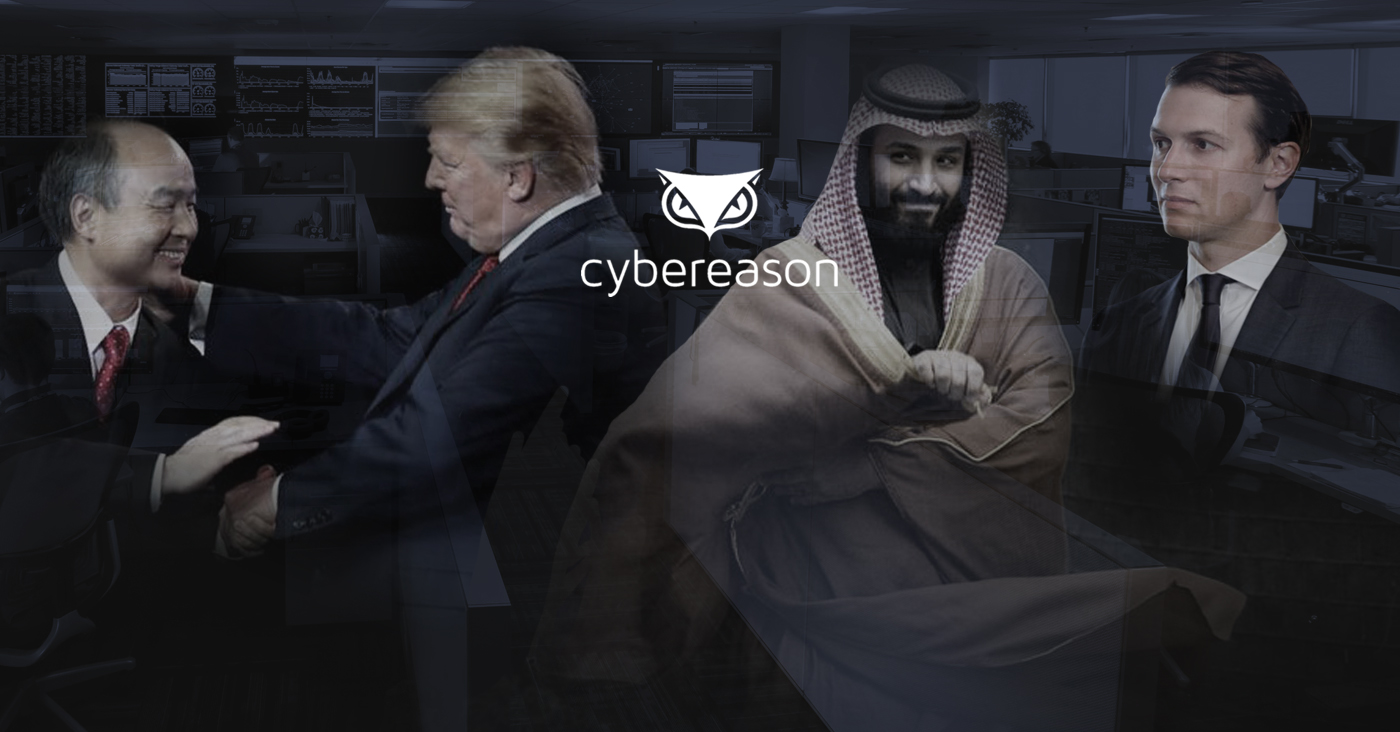Comey & Mueller Caught Funneling Billions in FBI Contracts to Lockheed Martin
How NeoCon Billionaire Paul Singer Is Driving the Outsourcing of US Tech Jobs to Israel
________
Source: MPN
How an Israeli Spy-Linked Tech Firm Gained Access to the US Gov't's Most Classified Networks
Through its main investors, SoftBank and Lockheed Martin, Cybereason not only has ties to the Trump administration but has its software running on some of the U.S. government's most classified and secretive networks.
by Whitney Webb | January 14th, 2020
If the networks of the U.S. military, the U.S. intelligence community and a slew of other U.S. federal agencies were running the software of a company with deep ties, not only to foreign companies with a history of espionage against the U.S. but also foreign military intelligence, it would — at the very least — garner substantial media attention. Yet, no media reports to date have noted that such a scenario exists on a massive scale and that the company making such software recently simulated the cancellation of the 2020 election and the declaration of martial law in the United States.
Earlier this month, MintPress News reported on the simulations for the U.S. 2020 election organized by the company Cybereason, a firm led by former members of Israel's military intelligence Unit 8200 and advised by former top and current officials in both Israeli military intelligence and the CIA. Those simulations, attended by federal officials from the FBI, DHS and the U.S. Secret Service, ended in disaster, with the elections ultimately canceled and martial law declared due to the chaos created by a group of hackers led by Cybereason employees.
The first installment of this three part series delved deeply into Cybereason's ties to the intelligence community of Israel and also other agencies, including the CIA, as well as the fact that Cybereason stood to gain little financially from the simulations given that their software could not have prevented the attacks waged against the U.S.' electoral infrastructure in the exercise.
First part: Why a Shadowy Tech Firm With Ties to Israeli Intelligence Is Running Doomsday Election Simulations
Also noted was the fact that Cybereason software could be potentially used as a backdoor by unauthorized actors, a possibility strengthened by the fact that the company's co-founders all previously worked for firms that have a history of placing backdoors into U.S. telecommunications and electronic infrastructure as well as aggressive espionage targeting U.S. federal agencies.
The latter issue is crucial in the context of this installment of this exclusive MintPress series, as Cybereason's main investors turned partners have integrated Cybereason's software into their product offerings. This means that the clients of these Cybereason partner companies, the U.S. intelligence community and military among them, are now part of Cybereason’s network of more than 6 million endpoints that this private company constantly monitors using a combination of staff comprised largely of former intelligence operatives and an AI algorithm first developed by Israeli military intelligence.
Cybereason, thus far, has disclosed the following groups as lead investors in the company: Charles River Ventures (CRV), Spark Capital, Lockheed Martin and SoftBank. Charles River Ventures (CRV) was among the first to invest in Cybereason and has been frequently investing in other Israeli tech start-ups that were founded by former members of the elite Israeli military intelligence Unit 8200 over the last few years. Spark Capital, based in California, appears to have followed CRV’s interest in Cybereason since the venture capitalist who co-founded Spark and led its investment in Cybereason is a former CRV partner who still has close ties to the firm.
While CRV and Spark Capital seem like just the type of investors a company like Cybereason would attract given their clear interest in similar tech start-ups coming out of Israel's cyber sector, Cybereason's other lead investors — Lockheed Martin and SoftBank — deserve much more attention and scrutiny.
Cybereason widely used by US Government, thanks to Lockheed
"A match made in heaven," trumpeted Forbes at the news of the Lockheed Martin-Cybereason partnership, first forged in 2015. The partnership involved not only Lockheed Martin becoming a major investor in the cybersecurity company but also in Lockheed Martin becoming the largest conduit providing Cybereason's software to U.S. federal and military agencies.
Indeed, as Forbes noted at the time, not only did Lockheed invest in the company, it decided to integrate Cybereason's software completely into its product portfolio, resulting in a "model of both using Cybereason internally, and selling it to both public and private customers."
Cybereason CEO and former offensive hacker for Israeli military intelligence — Lior Div — said the following of the partnership:
Lockheed Martin invested in Cybereason's protection system after they compared our solution against a dozen others from the top industry players. The US firm was so impressed with the results they got from Cybereason that they began offering it to their own customers – among them most of the top Fortune 100 companies, and the US federal government. Cybereason is now the security system recommended by LM to its customers for protection from a wide (sic) malware and hack attacks."Rich Mahler, then-director of Commercial Cyber Services at Lockheed Martin, told Defense Daily that the company's decision to invest in Cybereason, internally use its software, and include the technology as part of Lockheed Martin's cyber solutions portfolio were all "independent business decisions but were all coordinated and timed with the transaction."
How independent each of those decisions actually was is unclear, especially given the timing of Lockheed Martin's investment in Cybereason, whose close and troubling ties to Israeli intelligence as well as the CIA were noted in the previous installment of this investigative series. Indeed, about a year prior to their investment in the Israeli military intelligence-linked Cybereason, Lockheed Martin opened an office in Beersheba, Israel, where the IDF has its "cyberhub". The office is focused not on the sales of armaments, but instead on technology.
Marilyn Hewson, Lockheed Martin's CEO, said the following during her speech that inaugurated the company's Beersheba office:
The consolidation of IDF Technical Units to new bases in the Negev Desert region is an important transformation of Israel's information technology capability…We understand the challenges of this move. Which is why we are investing in the facilities and people that will ensure we are prepared to support for these critical projects. By locating our new office in the capital of the Negev we are well positioned to work closely with our Israeli partners and stand ready to: accelerate project execution, reduce program risk and share our technical expertise by training and developing in-country talent."Beersheba not only houses the IDF's technology campus, but also the Israel National Cyber Directorate, which reports directly to Israel's Prime Minister, as well as a high-tech corporate park that mostly houses tech companies with ties to Israel's military intelligence apparatus. The area has been cited in several media reports as a visible indicator of the public-private merger between Israeli technology companies, many of them started by Unit 8200 alumni, and the Israeli government and its intelligence services. Lockheed Martin quickly became a key fixture in the Beersheba-based cyberhub.
Not long before Lockheed began exploring the possibility of opening an office in Beersheba, the company was hacked by individuals who used tokens tied to the company, RSA Security, whose founders have ties to Israel's defense establishment and which is now owned by Dell, a company also deeply tied to the Israeli government and tech sector. The hack, perpetrated by still unknown actors, may have sparked Lockheed's subsequent interest in Israel's cybersecurity sector.
Soon after opening its Beersheba office, Lockheed Martin created its Israel subsidiary, Lockheed Martin Israel. Unlike many of the company's other subsidiaries, this one is focused exclusively on "cybersecurity, enterprise information technology, data centers, mobile, analytics and cloud" as opposed to the manufacture and design of armaments.
Marillyn Hewson, center, poses with Israeli gov. officials at the opening of Lockheed Martin’s facility in Beersheba. Photo | Diego Mittleberg
Haden Land, then-vice president of research and technology for Lockheed Martin, told the Wall Street Journal that the creation of the subsidiary was largely aimed at securing contracts with the IDF and that the company's Israel subsidiary would soon be seeking partnership and investments in pursuit of that end. Land oversaw the local roll-out of the company's Israel subsidiary while concurrently meeting with Israeli government officials. According to the Journal, Land "oversees all of Lockheed Martin's information-systems businesses, including defense and civilian commercial units" for the United States and elsewhere.
Just a few months later, Lockheed Martin partnered and invested in Cybereason, suggesting that Lockheed's decision to do so was aimed at securing closer ties with the IDF. This further suggests that Cybereason still maintains close ties to Israeli military intelligence, a point expounded upon in great detail in the previous installment of this series.
Thus, it appears that not only does Lockheed Martin use Cybereason's software on its own devices and on those it manages for its private and public sector clients, but it also decided to use the company's software in this way out of a desire to more closely collaborate with the Israeli military in matters related to technology and cybersecurity.
Please go to MPN to read the entire article.
________
The Downing of Ps752: Trump Motives, Multipolar Empire
Opportunity & the Israeli CyberWar Hypothesis
22. TRUMP IMPEACHMENT | CERN SOLEIMANI, CRYPTO, WW3,
A DRUG DEAL & A SWISS BANKER - PART 1
SNEAK PEAK PART II
Lockheed Martin operating in Israel? Sure would be profitable to get a war going with Iran. Maybe allow Iran to "shoot down" a Northrup Grumman RQ-4 Global Hawk drone to gain access to all that technology?
A Match Made In Heaven--Lockheed Martin Partners With Cybereason
Lockheed Martin names former DARPA director Walker as new CTO
Good read. This material at SOTT discusses technology transfers between Israel and Russia:
Was Iranian Missile Operator Tricked Into Shooting Down The Ukrainian Airlines Plane Over Tehran?
As we've stated before Zero Hedge is not to be trusted as an Alt Media news source.
CIA-MI6-MOSSAD Cabal Running Massive Regime Change Psyop in Iran
Ready for this?
Israel's Fingerprint Are All Over the Assassination of Qasem Soleimani
Ukrainian PS752 Mystery Solved: Shot Down by Israel's Unit 8200?
Ancillary reading (formulated the same year the guy in the limo was shot):
REPORT FROM IRON MOUNTAIN: ON THE POSSIBILITY AND DESIRABILITY OF PEACE
This guy in the back of the limo wanted peace, cooperation and reconciliation:
0:31 / 0:47
Assassinat de John F. Kennedy
The body guard of the guy shot in the clip below who was the brother of the guy shot in the limo above worked for what was then Martin Marietta that later merged with Lockheed Martin.
1968: Robert F. Kennedy Assassinated


No comments:
Post a Comment
Note: Only a member of this blog may post a comment.